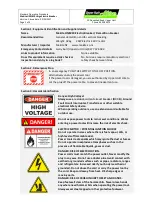
2
EN
Solar illumination system
A solar illumination system is a perfect solution on remote loca-
tions where the 230 V mains is not available. The system is primarily
intended to illuminate indoor locations, but it allows to connect
12 V, low power consumers as well, such as mobile phone chargers,
FM-transmitters, electric fence energizers, etc.
Elements of the system (Fig. A)
– Solar panel
– Control panel
– Bulbs
– Accumulator connection clamps
The control panel
– Charge indicator
– Charge level indicator
, , – Unused
, – Solar panel connection
, – Accumulator connection
, – Unused
– Cigarette lighter connector
– Light switch
– Glass fuse 10 A (5×20 mm, glass)
– Fixing holes
Installation
The system is shipped as partially assembled. Length of the cables:
• Solar panel ↔ Control panel – 5 m.
• Control panel ↔ Accumulator – 1,5 m.
• Control panel ↔ Bulbs – 5 m.
• Bulb ↔ Bulb – 5 m.
It is quite simple to install the system (Fig. B) – the solar panel has to
be mounted facing toward south and tilted in 45 degrees. Make sure
that no shadows are cast on its surface during the day. These three
conditions must be met.
The solar panel may be mounted on a roof of a building if the orien-
tation of the roof is toward south. If the south-facing condition is not
met, a supporting structure can be built for the solar panel to allow
the correct orientation.
The panel can be fixed through the holes (Fig. A) on its aluminum
frame.
The control panel must be installed in a place free of moisture (water
droplets, rain, snow), as the primary source of failure is moisture.
Upon choosing the right location for the control panel, consider the
ease of access, as the frequently used light switch is situated on this.
The bulbs has to be mounted in a moisture-free location, otherwise
the contacts in their sockets will deteriorate quickly over time.
Keep in mind that the solar panel produces electricity even in
low light, therefore avoid short circuits during handling and
installation! To prevent damaging the solar panel or the charge
controller, keep the solar panel covered with a light barrier
material until the installation is complete!
When extending the wires, be sure, the contacts are flawless
and the insulations are perfect! Always be sure that there is no
current in the wires during the installation – although the 12 V
continuous current is harmless, an accidental short circuit can
render the whole system useless!





































